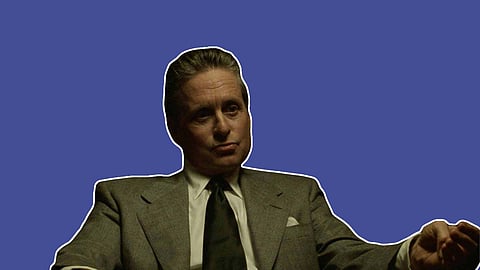
- Reviews
- Power List 2024
- Cannes 2024
- In-Depth Stories
- Web Stories
- News
- FC Lists
- Interviews
- Features
- FC SpecialsFC Specials

It is challenging to hide a secret in cinema. Most movies, especially ones that shape pop culture, get spoiled through echoes of loud whispers that you cannot help but overhear. Whether it is Psycho or Empire Strikes Back, no secret remains sacred.
This is what makes The Game so remarkable. Considered one of David Fincher’s most underrated movies, the film was a commercial failure, which is perhaps why its secret remained relatively sacred. The movie stars Michael Douglas as Nicholas Van Orton, a self-centered investment banker with a mundane routine, whose world comes crashing with a birthday gift from his younger brother, played by Sean Penn. The gift turns out to be an invitation to a literal game played in the real world, where Orton must overcome outlandish pranks, including a taxi crashing into the sea and having all his bank accounts hacked. Orton, who was previously cushioned by a life of enormous wealth, finds himself overwhelmed not only by these physically challenging scenarios but also emotional hurricanes from his past. He must come to terms with his relationship with his ex-wife and the looming memory of his father’s suicide. We see Orton gradually evolve into a more empathetic and flexible personality with each life-altering event.
All the outlandish ‘pranks’ in The Game finally lead to the most exciting climax in Fincher’s filmography (and that’s saying something considering the man also made Se7en, Fight Club and Gone Girl). In another bizarre turn-of-events, Orton kills his younger brother while he held Orton’s birthday cake (completing a year since he gifted Orton the ‘Game’). This shocks Orton so much that he jumps from the rooftop- exactly how his father killed himself. However, Orton ends up getting saved by the same company that manufactured this ‘Game’: we see him crashing into his own birthday party and his brother is not only alive but is also the one hosting this party. Orton’s life comes full circle, and with mended relationships and an evolved outlook to life, the movie ending with him going on another adventure.
I also had a more meta-reading into this turn-of-events: Orton initially resembles Michael Douglas’s characters in most of his movies from 80s and 90s, most remarkably Wall Street, where Douglas plays rich, mean, selfish, American men. What makes Orton so different is that the bizarre events of The Game force him to evolve. The movie could also be telling us that the meanness and selfishness of these seemingly negative characters played by Douglas could be due to lingering daddy-issues, such as the absence of Orton’s father. Douglas hence represented American men from that era who found that climbing the capitalistic ladder was the most convenient way to cope with said daddy-issues. The Game therefore helps us empathize with Douglas’s characters by giving Orton such a nuanced backstory. The twist then gives the characters closure by helping Orton come to terms with the most psychologically distressing event of his life.
What makes this twist so special is the sheer shock it evokes. The beats in the screenplay get more frequent as it approaches the awesome cliffhanger, making the audience more anxious with each moment. The outlandishness of the preceding ‘pranks’ only makes us increasingly curious about what could be. That it ends with the apparent death of two central characters who are then immediately revived makes it an absolute emotional rollercoaster. That every relationship in the movie gets such a complete arc, while the protagonist evolves so dramatically throughout, is just icing on the cake. The climax and anti-climax ensure that every character arc and storyline feel complete by the end.